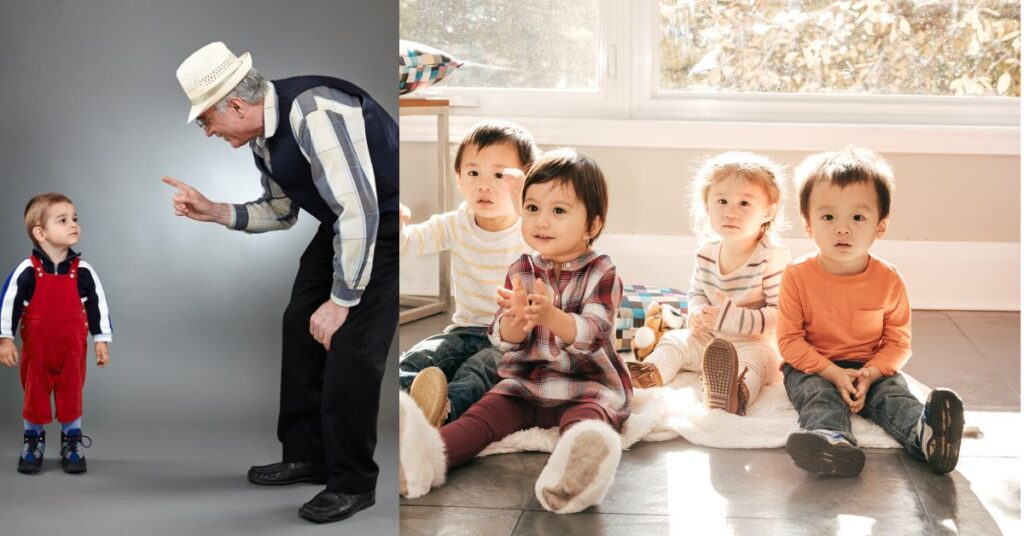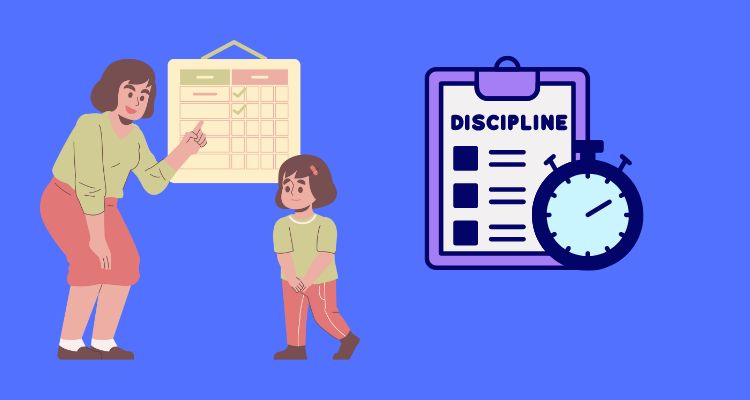Raising a child is a beautiful yet challenging journey. One of the biggest hurdles parents face is teaching discipline to toddlers. This article explores the everyday situations where discipline comes into play, along with some helpful tips to navigate these challenges and guide your little one towards good behavior.
Teaching Discipline to Toddlers: Practical Tips and Strategies

Establishing a Structured Routine
Young kids between the ages of 2-6 years old really do much better when they have structure in their day-to-day activities. This enables them to feel safe, know what is normal and learn self-discipline. First of all, create a routine in which the baby knows when it is time to eat, sleep, or play with him and put them to bed. Keep to set times of the day for these activities so that your child knows what to expect, and when to be able to fall into the routine of the household.
Setting Clear Boundaries and Expectations
Children do better when they know what the boundaries are in their environment. Before making the transition, talk openly with your child about your expectations (i.e. no hitting, sharing toys and doing the chores that are assigned to each of you) and sit down together for a brief period of time to focus on reading or playing quietly. Explain the why and what of these rules and they should understand they are there to protect them and help learn. Always follow through with consequences if they aren’t met, as well as praise when they are.
Positive Reinforcement Techniques
Disciplinary measures are not about punishing them, it’s also a way of fostering good behavior. Use a number of beneficial reinforcement techniques to motivate your kid’s good behavior. These rewards can take the form of verbal praise, a sticker chart or other small item. When your child displays that behavior without nagging, be sure and acknowledge and celebrate it. This will help affirm the behavior and encourage them to keep making positive decisions.
Encouraging Independence and Responsibility
Parents need to raise children so they become self-reliant and independent. Give children appropriate jobs to do like picking up their toys or putting out the plates. Guide and help, but let them do everything themselves. It will not only help to instill a sense of pride and ownership, but it will also teach them valuable life skills as well.
Dealing with Challenging Behaviors
Even the best-planned routines and most consistent expectations can still result in young children engaging in challenging behaviors. In these times of craziness keep calm do not yell or hardcore punishment Rather, attempt to acknowledge the emotions, be it of annoyance or if they were acting on tiredness or seeking your attention. Practice compassion and if needed suggest other methods to vent, as well as the use of reasonable consequences.
Model Positive Behavior
Children are hands-on learners. Parents should be good examples for their kids. In its place, model patience, kindness and self-control in your words and actions. Accept your missteps; apologize to your child and demonstrate what it looks like to make good on this. Not only will it instill vital skills into him or her this will reinforce the friendship between you two as well.
Work with Caregivers
Discipline is most effective when it is consistent in the child’s different caregiving environments – daycare, preschool and extended family. Even include open communication with these other adults in your child’s life to ensure you’re all on the same page when it comes to rules, expectations and consequences. This will give your child a consistent and supportive environment that encourages their self-discipline.
Seeking Professional Support
If your child continues to battle chronic troubles with behavior, there could be good reason for you to reach out to a professional, like a child psychologist or even family therapist. They can offer individualized coping techniques and ensure you and your child know how to handle these challenges together. Always keep in mind that this is not a sign of weakness but you wanting to do something for your child’s betterment!
Conclusion
Discipline in 2-6 year olds is not one-sided but is a process confused with consistency, positivity and firm boundaries. Your structured routine, established expectations, and on-target example will build their self-discipline and support that lifetime of skill development. Just keep in mind that every child is different but with the right practices, you can surely mould your child into a responsible and person of character.
FAQS on Teaching Discipline to Toddlers
My toddler throws tantrums whenever it’s time for bed. What can I do?
Stick to a consistent bedtime routine. This will help your child know what to expect and make bedtime less stressful.
Acknowledge their feelings. Let them know it’s okay to feel frustrated, but there are calmer ways to express themselves.
Offer choices. This can give your child a sense of control. Let them pick out their pajamas or choose a bedtime story.
Use positive reinforcement. Praise your child for calm behavior leading up to bedtime.
My child constantly argues and refuses to listen. How can I get them to cooperate?
Pick your battles. Focus on the most important rules and let go of minor things.
Give clear and concise instructions. Use simple language and avoid giving too many instructions at once.
Offer choices whenever possible. This can help your child feel like they have some control over the situation.
Use positive reinforcement. Catch your child following the rules and praise them for it.
My child keeps hitting or biting other children. How can I teach them gentle behavior?
Model gentle behavior yourself. Show your child how to interact with others in a kind and respectful way.
Teach them words for their emotions. Help your child understand why they might be feeling frustrated or angry.
Redirect their behavior. If your child starts to hit, gently move their hand away and offer them a toy to play with instead.
Use natural consequences. If your child hits another child, they may need to take a break from playtime.
Is it okay to use timeouts for discipline?
Timeouts can be an effective tool for discipline, but they should be used correctly.
Make sure the timeout is age-appropriate. A good rule of thumb is one minute per year of age.
Explain to your child why they are in timeout and what they need to do to earn their way out.
Use a quiet, safe space for timeouts. Avoid using timeouts as a punishment, but rather as a cooling-off period.
I feel like I’m always yelling at my child. How can I stay calm?
Take care of yourself. It’s hard to be patient with your child if you’re feeling stressed or exhausted. Make sure you’re getting enough sleep and eating healthy foods.
Take breaks when you need them. If you feel yourself getting frustrated, step away from the situation for a few minutes.
Practice relaxation techniques. Deep breathing exercises or mindfulness meditation can help you stay calm in stressful situations.
Focus on positive reinforcement. Catch your child being good and praise them for it. This will help create a more positive atmosphere in your home.
Connect with us on Facebook | X (Twitter) | Instagram | YouTube/Pinterest/LinkedIn/WhatsApp/Telegram






